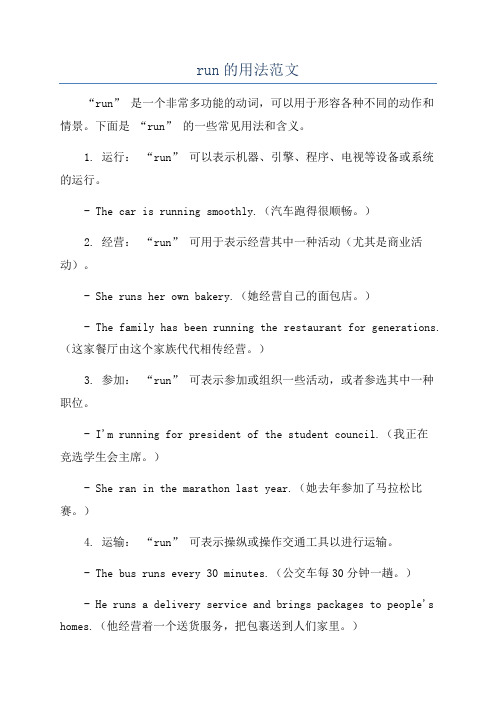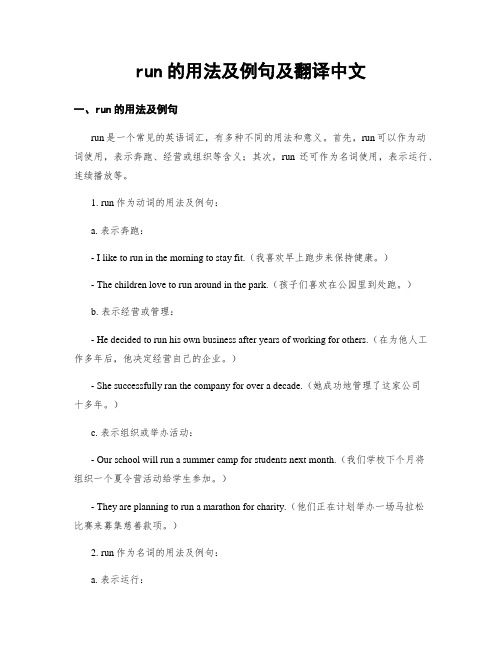run的详细用法
run的用法及搭配词组

run的用法及搭配词组一、run的基本含义及常见用法run这个词是英语中非常常见的一个动词,它有多种意思和用法。
首先,run 的基本含义是“跑”或“奔跑”。
例如,“The children are running in the park.”(孩子们正在公园里跑步)其次,run还可以表示“经营”或“运营”,特别指商业活动或机构的管理。
例如,“My sister runs a small bakery in the town.”(我姐姐在这个小镇上经营着一个面包店)。
除此之外,run也可以表示“进行”、“执行”或“操作”。
例如,“Let's run a simulation of the experiment before we begin.”(让我们在开始之前先模拟一下实验)。
二、run的搭配词组及用法解析1. run out of“run out of”意为“用光了”,表示某物已经不再可用或没有剩余。
“out of”短语表达缺乏或耗尽的情况。
例如,“I ran out of milk, so I couldn't make coffee this morning.”(我牛奶喝完了,所以今天早上没法煮咖啡)2. run over“run over”意为“碾过”,通常指车辆碾压到行人、动物或其他物体。
“over”指方向从上方或靠近一侧移动到另一侧。
“run over”的用法类似于“撞到”。
例如,“The car accidentally ran over a cat on the street.”(汽车在街上意外碾压了一只猫)3. run up“run up”有两种常见的用法。
首先,它可以指涨价或债务增加。
“up”表示增加或上升的状态。
例如,“He ran up a huge credit card debt while he was in college.”(他在大学期间用信用卡欠下了一笔巨额债务)其次,“run up”还可以表示快速地跑上某处,尤其是指向楼梯或阶梯跑去。
run的用法和搭配

run的用法和搭配一、基本含义Run是一个常用的英语动词,意为“跑”或“运行”。
在句子中可以作为谓语使用,表示某个动作或状态。
二、搭配与用法1. run+副词:表示跑的动作,可以搭配不同副词,例如run quickly(快跑)、run slowly(慢跑)等。
例句:The children ran quickly across the playground.(孩子们飞快地跑过操场。
)2. run+介词+名词:表示某物移动或发生的位置,可以搭配不同的介词,例如run from(从…逃跑)、run to(通向…的路)等。
例句:The children ran to the park after school.(放学后孩子们跑向公园。
)3. run+副词+比较级:表示跑步的比较,可以与其他人或事物进行比较。
例句:My dog runs faster than my friend's dog.(我的狗比朋友家的狗跑得快。
)4. run+名词+ed:表示某物已经停止或结束的状态,可以搭配不同的过去分词,例如run out(用完)、run over(撞车)等。
例句:I ran out of time and couldn't finish my homework.(我没时间完成作业了。
)5. run+形容词+副词:表示跑步的品质或特点,例如running fast(跑得快)、running well(跑得好)等。
例句:The athlete runs well and always finishes the race in the top three.(这个运动员跑得很好,总是在前三名以内完成比赛。
)6. 常用搭配:run away/off(逃跑)、run out of(用完)、run into(撞上)等。
例句:The thief ran away after stealing the money.(小偷偷了钱后逃跑了。
run的用法范文

run的用法范文“run” 是一个非常多功能的动词,可以用于形容各种不同的动作和情景。
下面是“run” 的一些常见用法和含义。
1. 运行:“run” 可以表示机器、引擎、程序、电视等设备或系统的运行。
- The car is running smoothly.(汽车跑得很顺畅。
)2. 经营:“run” 可用于表示经营其中一种活动(尤其是商业活动)。
- She runs her own bakery.(她经营自己的面包店。
)- The family has been running the restaurant for generations.(这家餐厅由这个家族代代相传经营。
)3. 参加:“run” 可表示参加或组织一些活动,或者参选其中一种职位。
- I'm running for president of the student council.(我正在竞选学生会主席。
)- She ran in the marathon last year.(她去年参加了马拉松比赛。
)4. 运输:“run” 可表示操纵或操作交通工具以进行运输。
- The bus runs every 30 minutes.(公交车每30分钟一趟。
)- He runs a delivery service and brings packages to people's homes.(他经营着一个送货服务,把包裹送到人们家里。
)5. 管理:“run” 可用于表示管理或组织一些组织或机构。
- He runs a successful advertising agency.(他经营着一家成功的广告公司。
)6. 快速移动:“run” 可表示快速移动,奔跑或行驶。
- The children were running around in the park.(孩子们在公园里到处跑。
)- The horse ran as fast as it could.(那匹马跑得飞快。
run的用法及其词组解释翻译

run的用法及其词组解释翻译一、run的用法及基本解释Run是一个常用的动词,在英语中有多种含义和用法。
下面将对其常见的用法及基本解释进行详细介绍。
1. 表示快速移动或奔跑“run”最常见的意思就是“奔跑”,可以涵盖从慢慢移动到飞奔等各种速度范围。
例如:“He ran to catch the bus.”(他跑着赶上了公交车。
)2. 经营或管理Run还可以表示经营或管理某事物。
这个意思通常与企业、机构或项目相关。
“I want to run my own business.”(我想经营自己的生意。
)3. 处于状态或持续运行Run还可以形容事物处于某种状态或持续运行。
“The car is running smoothly.”(汽车在顺利行驶。
),“The computer runs all day and night without turning off.”(电脑日夜不停地运行着。
)4. 进行比赛或竞选Run也可表示参加比赛、竞选等活动。
“She is running for president.”(她正在竞选总统职位)。
这里“running”指的是参与竞选活动。
二、run的常见词组和翻译下面列举了一些常见的以“run”为主要词汇的词组,并提供了相应的翻译。
1. run out of (用完,耗尽)Running out of something 意味着某个物品已经用完或者快用完。
“I ran out of milk, so I need to buy more.”(我牛奶用完了,所以需要再买一些。
)2. run into (偶然遇见)Run into意味着偶然遇见某人或发生某种情况。
“I ran into my old friend at the supermarket yesterday.”(昨天我在超市里偶遇到一个老朋友。
)3. run over (撞倒,碾压)Run over是指车辆撞倒或压过某个物体。
run的用法总结

run的用法总结一、简介"run"是一个多功能的英语动词,可以表示跑步、运行、操作等意思。
在不同语境中,"run"的用法有所区别。
本文将总结并介绍这些用法。
二、表示跑步1. 描述人类跑步:使用"run"可描述人类进行跑步活动。
比如,我们可以说:"Tom runs every morning to keep fit."(汤姆每天早上跑步保持健康。
)2. 描述其他生物跑步:除了人类,我们也可使用"run"来描述其他生物进行奔跑。
例如:"The cheetah can run at incredible speeds."(猎豹能以无与伦比的速度奔跑。
)三、表示运行1. 表示机械运转:在技术领域中,我们常用"run"来描述机械设备的运转情况。
例如:"The engine is running smoothly."(发动机运行平稳。
)2. 表示程序执行:在计算机科学领域,我们常用"run"来指代程序的执行过程。
比如:"I am running a simulation on my computer."(我正在电脑上进行模拟实验。
)四、表示操作1. 进行某项活动:当我们希望表达某项活动正在进行或被完成时,可以使用"run"来表示这个意思。
例如:"I need to run errands after work."(下班后我需要办点事情。
)2. 主持会议或活动:"run"也可用来表示主持、组织会议或活动的意思。
例如:"She ran the meeting efficiently and effectively."(她高效地主持了会议。
run的用法及例句及翻译中文

run的用法及例句及翻译中文一、run的用法及例句run是一个常见的英语词汇,有多种不同的用法和意义。
首先,run可以作为动词使用,表示奔跑、经营或组织等含义;其次,run还可作为名词使用,表示运行、连续播放等。
1. run作为动词的用法及例句:a. 表示奔跑:- I like to run in the morning to stay fit.(我喜欢早上跑步来保持健康。
)- The children love to run around in the park.(孩子们喜欢在公园里到处跑。
)b. 表示经营或管理:- He decided to run his own business after years of working for others.(在为他人工作多年后,他决定经营自己的企业。
)- She successfully ran the company for over a decade.(她成功地管理了这家公司十多年。
)c. 表示组织或举办活动:- Our school will run a summer camp for students next month.(我们学校下个月将组织一个夏令营活动给学生参加。
)- They are planning to run a marathon for charity.(他们正在计划举办一场马拉松比赛来募集慈善款项。
)2. run作为名词的用法及例句:a. 表示运行:- The run of the machine can be controlled by a simple switch.(这台机器的运行可以通过简单的开关控制。
)- I forgot to turn off my computer before leaving, so it was on a continuous run.(在离开前我忘记关电脑了,所以它一直在运行。
)b. 表示连续播放:- We watched a movie marathon and had a run of four films in one night.(我们看了一场电影马拉松,在一个晚上看了连续播放的四部电影。
run的用法和短语例句

run的用法和短语例句run有跑;行驶;运转;运营;持续;蔓延;传播;竞选;遭遇等意思,那么你知道run的用法吗?下面跟着店铺一起来学习一下,希望对大家的学习有所帮助!run的用法:run的用法1:run的基本意思是“跑”“移动”,指人、动物或车辆以一定速度前进或移动,引申可表示“(使)流动”,指水流、血液或眼泪比较湍急、源源不断地在一段时间内流淌。
用在日常非正式场合时,还可表示“操纵”“管理”,指使具体事物或企业按照人的意志进行或发展。
引申可表示“延伸”“延续”等。
run的用法2:run主要用作不及物动词,也可用作及物动词。
用作及物动词时,接名词、代词或由that引导的从句作宾语,有时还可接双宾语,其间接宾语可转化成介词to或for的宾语。
可用于被动结构。
run 用作不及物动词时其后可跟动词不定式作状语,不定式符号to有时可以省略。
run的用法3:run还可用作系动词,意思是“用”“达到”“变得”,常接形容词作表语。
用于比赛时可接序数词,表示“跑第几名”。
run的用法4:run的现在进行时可表示按计划或安排、打算将要发生的动作,此时句中一般有表明将来的时间状语或特定的上下文。
run的用法5:run的过去式是ran,过去分词是run。
run的用法6:run作“管理”解时是非正式用语,正式场合应该用operate或manage。
run的常用短语:run about (v.+adv.)run across1 (v.+adv.)run across2 (v.+prep.)run after (v.+prep.)run against (v.+prep.)run along1 (v.+adv.)run along2 (v.+prep.)run around (v.+adv.)run at (v.+prep.)run away (v.+adv.)run away/off with (v.+adv.+prep.)run back (v.+adv.)run back over (v.+adv.+prep.)run down1 (v.+adv.)run down2 (v.+prep.)run for (v.+prep.)run in (v.+adv.)run into (v.+prep.)run的用法例句:1. The ballot was re-run on Mr Todd's insistence after accusations of malpractice.因被控舞弊,在托德先生的坚持下重新进行了投票。
run的用法及其词组短语

run的用法及其词组短语一、run的用法及其词组短语运动是人类生活中不可或缺的一部分,而英语中表示“跑”的动词就是“run”。
这个词有着丰富的用法和多样的词组短语,本文将详细介绍“run”的用法及相关搭配。
1. 简单用法首先,我们来看一下“run”最基本的用法。
“run”作为一个正常的动词,可以表示快速地移动或奔跑。
例如:“He runs every morning for exercise.”(他每天早晨都跑步锻炼。
)在这个例句中,“run”表示这个人每天早晨进行运动。
2. 涵盖范围广泛除了表示奔跑外,“run”还有多种独特的意义和搭配。
它可以表示管理、操作、经营等含义。
例如:“She runs a successful business.”(她经营着一家成功的生意。
)这里,“run”指代经营一家生意。
3. 形成词组短语此外,根据具体语境,“run”还可以与其他单词形成常用的词组短语,增加其表达能力和语境适应性。
a) Run out 打发光;耗尽当某物被完全使用、消耗或耗尽时,可以使用“run out”。
例如:“We have run out of milk. I need to go to the store.”(我们的牛奶用完了。
我需要去商店买一些。
)在这个例句中,“run out”表示缺乏某种物品,需要采取补充措施。
b) Run into 撞上;遇到当你意外地遇到某人或碰到了问题时,可以使用“run into”。
例如:“I ran intomy old friend at the grocery store.”(我在杂货店里偶然遇到了我的老朋友。
)这里,“run into”表示意外地遇到了朋友。
c) Run away 逃跑当你离开某个地方或逃离某个困境时,可以使用“run away”。
例如:“The dog ran away from home.”(狗从家里跑掉了。
)这里,“run away”表示离开家。
- 1、下载文档前请自行甄别文档内容的完整性,平台不提供额外的编辑、内容补充、找答案等附加服务。
- 2、"仅部分预览"的文档,不可在线预览部分如存在完整性等问题,可反馈申请退款(可完整预览的文档不适用该条件!)。
- 3、如文档侵犯您的权益,请联系客服反馈,我们会尽快为您处理(人工客服工作时间:9:00-18:30)。
run下载纠错下载离线词库以备不时之需英[rʌn]美[rʌn]vi. 经营;奔跑;运转vt. 管理,经营;运行;参赛n. 奔跑;赛跑;趋向;奔跑的路程n. (Run)人名;(塞)鲁恩广告扫地机器人,预约超2万台朗文词典柯林斯词典21世纪词典run1/rʌn,rʌn/v.S1W1英[rʌn]pt:ran pp:run pres part:runningMEANINGS 义项1.MOVE QUICKLY USING YOUR LEGS奔跑[I]to move very quickly, by moving your legs more quickly than when you walk跑,奔跑•The children came running out of the house. 孩子们从屋里跑出来。
•Women ran screaming, with children in their arms. 妇女们抱着孩子,一边跑一边尖叫。
•Jane struggled free and ran for her life(=ran in order to avoid being killed) . 简挣脱出来,赶紧逃命。
•Hurry!Run for it(=run as quickly as possible in order to escape) ! 快!快逃!•He picked up the child and ran like hell. (=ran very quickly, especially in order to escape) 他抱起孩子,拼命奔逃。
[+ down/up/to/towards etc]•I ran down the stairs as fast as I could. 我尽可能快地跑下楼梯。
•He was running towards the door. 他正朝着门口跑去。
•She turned and ran away. 她转身跑掉了。
•The boys ran off into the crowd. 男孩们跑进了人群。
run to do sth•Several people ran to help her when she fell. 她摔倒了,好几个人跑去扶她。
[T]to run a particular distance跑〔某段距离〕•Firefighters are to run 500km to raise money for a children’s charity. 消防人员将跑500公里,为一个儿童慈善机构筹款。
•He ran the length of the corridor. 他从走廊的这头跑到另一头。
2.RACE赛跑[I,T]to run in a race参加(赛跑)•I’d never run a marathon before. 我以前从未参加过马拉松比赛。
[+ in]•Murray has said she will consider running in the 3,000 metres. 默里说她将考虑参加3,000米赛跑。
[T usually passive]if a race is run at a particular time or in a particular place, it happens at that time or in that place举行〔比赛〕•The Derby will be run at 3 o’clock. 德比马赛将于3点钟举行。
3.ORGANIZE/BE IN CHARGE OF组织/掌管[T]to organize or be in charge of an activity, business, organization, or country组织;掌管;管理;经营THESAURUSCONTROL•For a while, she ran a restaurant in Boston. 有一段时间她在波士顿开餐馆。
•Many people don’t care who runs the country. 很多人不在乎由谁统治国家。
•Courses are currently being run in London and Edinburgh. 目前伦敦和爱丁堡两地都开设了这些课程。
•Many people belong to a pension scheme run by their employers. 许多人参加了由雇主管理的养老金计划。
•a state-run(=controlled by the government) television station 国营电视台well/badly run•The hotel is well-run and extremely popular. 这家酒店经营得很好,十分受欢迎。
显示更多THESAURUS 词语辨析1.to move very quickly, by moving your legs more quickly than when you walk•My five-year-old son runs everywhere. 我五岁大的儿子到处跑。
•I go running twice a week. 我一星期跑步两次。
2.jog慢跑to run quite slowly for exercise over a long distance•A few people were jogging in the park. 一些人在公园里慢跑。
3.race/dash飞奔to run somewhere as quickly as you can, especially because you have to do something urgently•He dashed across the road to the police station. 他飞快地穿过马路奔向警察局。
•We raced to the bus stop and got there just in time. 我们奔到公共汽车站,好赶上。
4.sprint〔短距离〕冲刺to run as fast as you can for a short distance•I saw the runners sprinting past. 我看到选手们冲了过去。
•He sprinted up the stairs. 他飞奔上楼。
5.to run very quickly and without really looking where you are going, because you are in a hurry•He tore down the street and around the corner. 他在街上飞奔,然后转过街角。
6.charge猛冲to run quickly and with a lot of energy, so that you might knock down anyone or anything that gets in your way•They all charged out of the school gates at 4 o’clock. 一到4点,他们全都冲出校门。
7.take to your heels逃跑to start running away very quickly, especially to escape or because you are afraid •The men took to their heels as soon as they saw the police. 那些男子一看到警察就逃。
收起ANIMALS RUNNING 动物跑1.trot〔尤指马和狗〕小跑to run fairly slowly, taking short steps – used especially about horses and dogs•A little dog was trotting behind her. 一只小狗跟在她身后跑。
2.gallop〔马〕飞跑if a horse gallops, it runs very quickly•The horse galloped off across the field. 那匹马飞奔穿过田野。
→running→at 见cut→cut and run at 见cut38→at 见counter→be/run/go counter to sth at 见counter→at 见deep→run deep at 见deep4→at 见dry→run dry at 见dry4→at 见low→run low at 见low4→at 见ragged→run sb ragged at 见ragged5→at 见ring→run rings around sb at 见ring8→at 见riot→run riot at 见riot2→at 见short→be running short at 见short2→at 见earth→run sb/sth to earth at 见earth14→at 见fat→run to fat at 见fat6→at 见ground→run sb/sth to ground at 见ground19→at 见seed→run to seed at 见seed4→at 见wild→run wild at 见wild1→at 见up→be up and running at 见up12PHRVB 短语动词run across sb/sthphr v1.to meet someone or find something by chance与…不期而遇,偶然碰见;偶然发现•I ran across him at a conference in Milan. 我在米兰的一次大会上碰到过他。
•I ran across some old love letters while I was clearing out a cupboard. 我在清理柜子时找到一些旧情书。
run after sb/sthphr v1.to chase someone or something追逐,追赶•He ran after her, calling her name. 他叫着她的名字在后面追她。
2.to try to start a sexual relationship with someone追求〔某人〕•He’s always running after younger women. 他老是追求年轻女子。
